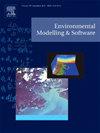Adaptive Surrogate Model Assisted Swarm Intelligence for Parameter Inversion of complex hydrological models
IF 4.8
2区 环境科学与生态学
Q1 COMPUTER SCIENCE, INTERDISCIPLINARY APPLICATIONS
引用次数: 0
Abstract
Parameter inversion in hydrological models aims to estimate parameters from observed data, improving accuracy and understanding of the system. This process typically involves optimization algorithms to identify optimal parameter combinations, often resulting in significant computational costs due to the necessity for numerous model runs, particularly in complex hydrological models. To address this challenge, this study introduces the Adaptive Surrogate Model Assisted Swarm Intelligence (ASMA-SI) framework. ASMA-SI uses the iterative traces of swarm intelligence (SI) as a training sample set, fostering a tightly coupling between SI and the surrogate model while minimizing computational demands and enhancing search efficiency. The framework was applied to enhance three prominent SI algorithms: Particle Swarm Optimization (PSO), Grey Wolf Optimizer (GWO), and Whale Optimization Algorithm (WOA). Synthetic experiments and a case study were conducted to evaluate the inversion efficacy of ASMA-SI. In the synthetic experiments, ASMA-SI demonstrated faster convergence to the ‘true value’, while in the real-world case study, it outperformed in nearly all of the nine test groups, achieving better average performance metrics.
求助全文
约1分钟内获得全文
求助全文
来源期刊

Environmental Modelling & Software
工程技术-工程:环境
CiteScore
9.30
自引率
8.20%
发文量
241
审稿时长
60 days
期刊介绍:
Environmental Modelling & Software publishes contributions, in the form of research articles, reviews and short communications, on recent advances in environmental modelling and/or software. The aim is to improve our capacity to represent, understand, predict or manage the behaviour of environmental systems at all practical scales, and to communicate those improvements to a wide scientific and professional audience.
 求助内容:
求助内容: 应助结果提醒方式:
应助结果提醒方式:


